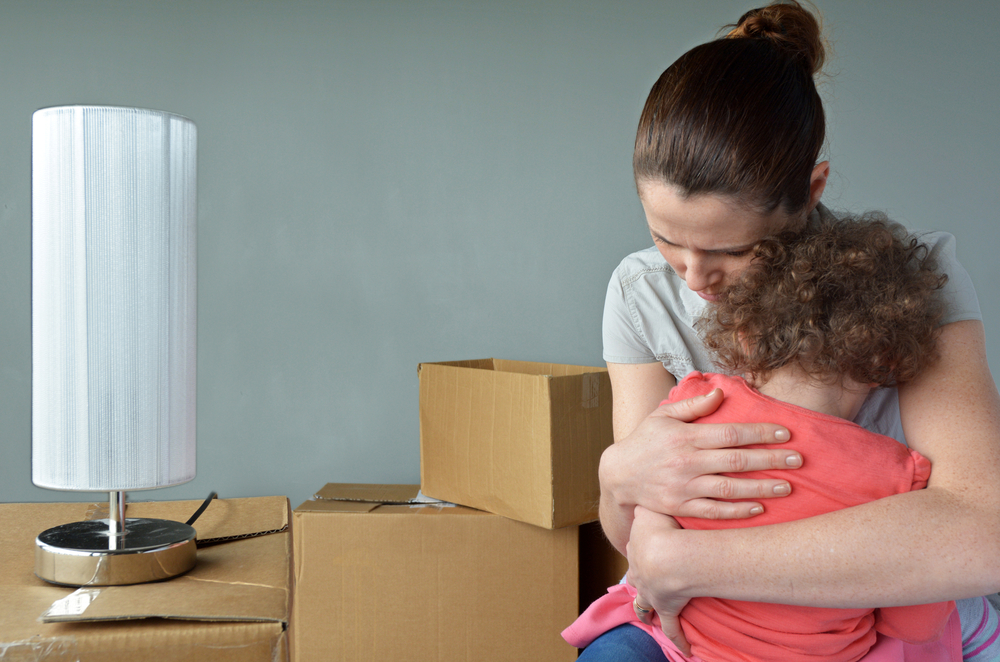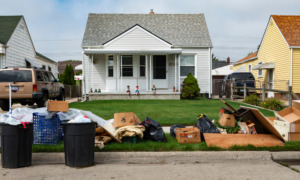
ChameleonsEye/Shutterstock
.
Many families with children are facing a looming threat during the coronavirus pandemic — the loss of their home.
Nearly one-third of people across the United States had trouble paying their rent in April, based on National Multifamily Housing Council figures. Then last week, unemployment figures rose by 6 million. As a result, even more people will have trouble paying rent.
Unless governments take action to assist renters, this could be “a deep and jagged scar on the next generation,” said Matthew Desmond, founder of eviction data site, Eviction Lab at Princeton University.

Eviction Lab
Matthew Desmond
Evictions have been a large and growing problem, one highlighted by Desmond in his 2016 book “Evicted: Poverty and Profit in the American City,” based on research in Milwaukee. African-American women are particularly hard-hit, he found.
Living with children almost triples your odds of receiving an eviction notice, Desmond said in a webinar Monday hosted by the National Press Foundation. “Having kids is actually a risk factor,” he said.
This problem has been in the making for a long time, but the pandemic has brought it into high relief, he said.
When families lose housing, the young face a cascade of consequences.
“Kids often have to switch schools. They’re usually moving to neighborhoods with higher levels of crime and poverty,” Desmond said.
With an eviction on their record, families can have trouble renting from other landlords, he said.
Research shows that In the year following eviction, mothers and children had worse health, more material hardship and greater parental stress. Mothers also had a greater likelihood of depression, the research showed.
Evictions eclipse foreclosures
In the wake of the current economic crisis, many states and local governments have sought to restrict evictions, but aren’t fully dealing with the problem, said Alieza Durana, with the Eviction Lab.
“What we’re seeing is a policy patchwork across the country,” she said in the webinar.
Many states are allowing court eviction filings even if they have frozen other parts of the eviction process, she said. Some freeze old filings, others freeze new filings, and some allow municipalities broad leeway in interpreting the law, she said.
“Some are not as proactive in protecting tenants,” and eviction filings are piling up, Durana said. “It demonstrates the importance of freezing the entire process.”
In the 2008 recession, many homeowners lost their houses to foreclosure.
Desmond’s research shows that evictions of renters far surpass the number of foreclosures experienced by homeowners. About 1 in 17 renter households were evicted from 2000 to 2016, far higher than the number of foreclosures.
Before the COVID-19 pandemic, the United States was in a giant housing crisis, Desmond said.
He cited three causes:
- Incomes for Americans have been flat in the last two decades.
- Rents have soared (a 70% increase since 1995, adjusted for inflation).
- Governments have not responded to the problem.
Only one in four people who qualify for government rent assistance can actually get assistance, according to Desmond. Renters in poverty spend more than 50% of their income on housing, and some actually pay more than 70%, he said.
“So that leads us into a situation in which evictions have become incredibly common around the country,” he said.
It’s not just an issue on the East and West coasts.
“Some small towns and suburban areas have eviction rates that rival that of the big cities,” he said.































